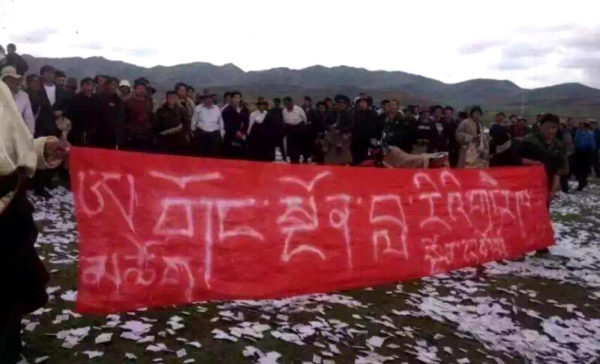Prime Minister Dr Lobsang Sanjay has spoken out against the illegal mining projects that are only increasing in strength and fervour across Tibet, as well as the violent suppression of peaceful demonstrations, allowed under Chinese law.
Three protests in different regions of the country are known to have taken place last month with local people becoming increasingly distressed by what Dr Sangay describes as the “occupation of Tibet, the repression of the Tibetan people and the environmental destruction.”
The sacred mountain of Nyenchen Gong-ngon Lari is being mined for gold and large areas have been gravely damaged. About 300 Tibetans including both monks and lay people took to the streets for several days, demanding the immediate withdrawal of Chinese excavators and a halt to the digging.
The protestors gathered in the town of Achok Yultso, Amdo with a huge red banner reading: “Prevent Nyenchen Gong-ngon Lari from mining” in Tibetan and Chinese. People could be heard shouting: “Please protect the environment,” “stop mining,” “protect the holy mountain,” “we want people’s safety “and” victory of the Holy Mountain”. They also called the Chinese out on their hypocrisy; mining land without the local people’s consent is against the law yet is happening more and more frequently.
In other footage, more than 100 people can be seen confronting armed police outside the local government office, shouting: “Stop the destruction of the environment”. One local made references to the speeches of Chinese Communist Party leader Xi Jinping, many of which have voiced support for ecological and environmental protection.
One protester described the brutal way in which the Chinese military broke-up the demonstration: “Six of the protest leaders were beaten, one so severely that he was rushed to a hospital in the provincial capital Chengdu, while the other five were taken to a nearby military hospital.” Two of the six have since been named as Tsewang Kyab of Amchok’s Angon village and Gogen of Pung village and all were released from hospital on June 6.
The mining of Nyenchen Gong-ngon Lari has been going on for sixteen years and despite repeated appeals to stop it has only intensified. In November 2012, two Tibetans self-immolated at the entrance of the gold mine. Tsering Dhondup, 35, set fire to himself on November 20, 2012, and Konchok Tsering, 18, did the same six days later.
“Tsering wanted to highlight the hardship and suffering of the local Tibetans harmed by mining activities,” one friend said of him, describing him as a “gentle character,” devoted to both environmental issues and Tibet’s cause as a whole.
A third Tibetan who self-immolated also wrote about the suffering that Tibetans faced due to Chinese mining activities in the area in his last ever written statement.
Tibet has become an important source of minerals needed for China’s economic growth, and mining operations have lead to widespread environmental damage including the pollution of water sources for livestock and humans as well as the destruction of sacred sites, experts have observed.
Two similar demonstrations – both where holy ground is being destroyed in the search for minerals – have also been reported in the Akhore Township of Chuchen County in Amdo, and Yulshok Gargye in the Kham Province of eastern Tibet.
Armed police have been sent to Akhore to monitor Tibetans, where they have been subjected to round-the-clock surveillance and repeated threats of arrest. Warnings made through loud speakers promise severe reprisals including fines and prison sentences to anyone caught disrupting the mining project.
Protests against mining and to protect the environment are becoming increasingly common. They are also extremely dangerous. As Chinese authorities accelerate large-scale operations to excavate copper, gold, silver, chromium and lithium, Tibetans who convey concern about the impact of toxic waste, deforestation and erosion risk being imprisoned, tortured, or even killed.





 Print
Print Email
Email